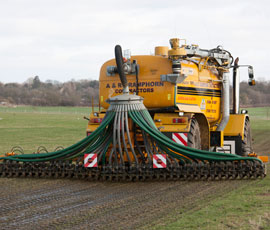NVZ rule changes come into force

The introduction of revised nitrate vulnerable zone rules has been met by a mixed reaction from the NFU.
Changes to NVZ boundaries which came into force under the new rules on Friday 17 May, mean about 6,700 farms will be released from the restrictions – a fact the union welcomed.
Other revisions include allowing spreading of manure to within 6m of watercourses when using precision spreading equipment and the removal of the need to keep certain records when applying nitrate in a low intensity situation. Both of these changes, which apply within NVZs for the next four years, also met with NFU approval.
However, the NFU said it was disappointed with a decision to extend the closed period on medium or heavy land for a further two weeks – until the end of January. It was also unhappy with new requirements not subject to the original consultation that will be placed on temporary manure field heaps to be as “reasonably compact as possible”.
NVZ changes
- 10,000 farmers will come out of NVZs and 2,500 farmers will be in NVZs for the first time.
- Fewer records for low-intensity farmers
- Incentive to use precision slurry application techniques allowing slurry spreading closer to watercourses
- More flexibility for some specialist grass growers
Deputy president Meurig Raymond said: “After several months of uncertainty and appeals, the new rules provide some clarity to those in areas under designation and a slight reduction in area designated in England reflects the declining nitrate trends in some areas.
“In addition, we are pleased that DEFRA has listened and backed down on proposals to introduce retrospective application of standards to older, 20-year-plus silage, slurry and agricultural fuel oil stores, and recognised the need to review the evidence on the condition of these stores.”
But he said the union remained strongly opposed to the government’s plan to extend nitrate spreading closed periods, as DEFRA’s own evidence recognised that the move just swapped nitrate in water for the same amount of ammonia released to the atmosphere.
“Further, the introduction of new rules for manure heaps appears to us to be completely unnecessary and not evidence based. We are working with DEFRA and the Rural Payments Agency to ensure that this new requirement will be fairly and practically interpreted by inspectors, with minimal impact on farmers,” he said.
But a DEFRA spokeswoman said the changes were relatively small in scale and reflected both new scientific evidence and views expressed in the consultation.
“The area under NVZ rules in England has reduced from the current 62% of land area to 58%. This is good news, and reflects water quality improvements in recent years,” the spokeswoman said.
Read about NVZs
Join our forum for discussions on NVZs

